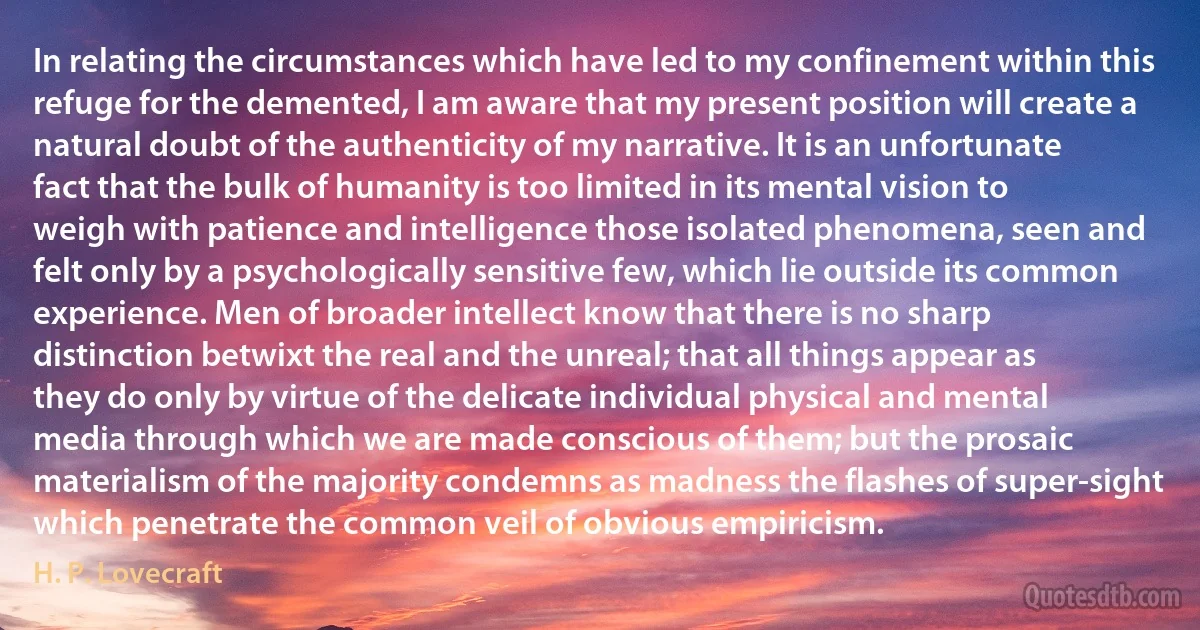
In relating the circumstances which have led to my confinement within this refuge for the demented, I am aware that my present position will create a natural doubt of the authenticity of my narrative. It is an unfortunate fact that the bulk of humanity is too limited in its mental vision to weigh with patience and intelligence those isolated phenomena, seen and felt only by a psychologically sensitive few, which lie outside its common experience. Men of broader intellect know that there is no sharp distinction betwixt the real and the unreal; that all things appear as they do only by virtue of the delicate individual physical and mental media through which we are made conscious of them; but the prosaic materialism of the majority condemns as madness the flashes of super-sight which penetrate the common veil of obvious empiricism.
H. P. LovecraftRelated topics
appear authenticity bulk common confinement doubt empiricism experience felt few intelligence men led lie limited madness materialism media narrative natural outside patience position present real refuge relating seen sensitive sharp unfortunate virtue vision weigh circumstances thingsRelated quotes
On September 16, 1978, there was an eclipse of the moon in Riyadh. Late one afternoon it became visible: a dark shadow moving slowly across the face of the pale moon in the darkening blue sky. There was a frantic knocking on the door. When I opened it, our neighbor asked if we were safe. He said it was the Day of Judgement, when the Quran says the sun will rise from the west and the seas will flood, when all the dead will rise and Allah's angels will weigh our sins and virtue, expediting the good to Paradise and the bad to Hell. Though it was barely twilight, the muezzin suddenly called for prayer--not one mosque calling carefully after another, as they usually did, but all the mosques clamoring all at once, all over the city. There was shouting across the neighborhood. When I looked outside I saw people praying in the street.

Ayaan Hirsi Ali
The truth, first of all, about Dreyfus' trial and conviction: At the root of it all is one evil man, Lt. Colonel du Paty de Clam, who was at the time a mere Major. He is the entire Dreyfus case, and the entirety of it will only come to light when an honest enquiry firmly establishes his actions and responsibilities. ... Nobody would ever believe the experiments to which he subjected the unfortunate Dreyfus, the traps he set for him, the wild investigations, the monstrous fantasies, the whole demented torture.
Ah, that first trial! What a nightmare it is for all who know it in its true details. Major du Paty de Clam had Dreyfus arrested and placed in solitary confinement. He ran to Mme Dreyfus, terrorised her, telling her that, if she talked, that was it for her husband. Meanwhile, the unfortunate Dreyfus was tearing his hair out and proclaiming his innocence.

Émile Zola
"And the upshot of all this," so I have been told more than once and by more than one person, "will be simply that all you will succeed in doing will be to drive people to the wildest Catholicism." And I have been accused of being a reactionary and even a Jesuit. Be it so!... I know very well it is madness to seek to turn the waters of the river back to their source, and that it is only the ignorant who seek to find in the past a remedy for their present ills; but I know too that anyone who fights for any ideal whatever, although his ideal may seem to lie in the past, is driving the world on to the future, and that the only reactionaries are those who find themselves at home in the present. Every supposed restoration of the past is a creation of the future, and if the past which it is sought to restore is a dream, something imperfectly known, so much the better.

Miguel de Unamuno
The universe is of the nature of a thought or sensation in a universal Mind... To put the conclusion crudely - the stuff of the world is mind-stuff. As is often the way with crude statements, I shall have to explain that by "mind" I do not exactly mean mind and by "stuff" I do not at all mean stuff. Still that is about as near as we can get to the idea in a simple phrase. The mind-stuff of the world is something more general than our individual conscious minds; but we may think of its nature as not altogether foreign to feelings in our consciousness... Having granted this, the mental activity of the part of world constituting ourselves occasions no great surprise; it is known to us by direct self-knowledge, and we do not explain it away as something other than we know it to be - or rather, it knows itself to be.

Arthur Eddington
In the history of madness, two events signal this change with singular clarity: in 1657, the founding of the Hôpital Général, and the Great Confinement of the poor; and in 1794, the liberation of the mad in chains at Bicêtre. Between these two singular and symmetrical events, something happened, whose ambiguity has perplexed historians of medicine: blind repression in an absolutist regime, according to some, and, according to others, the progressive discovery, by science and philanthropy, of madness in its positive truth. In fact, beneath these reversible meanings, a structure was taking shape, which did not undo that ambiguity but was decisive for it. This structure explains the passage from the medieval and humanist experience of madness to the experience that is our own, which confines madness in mental illness.

Michel Foucault
